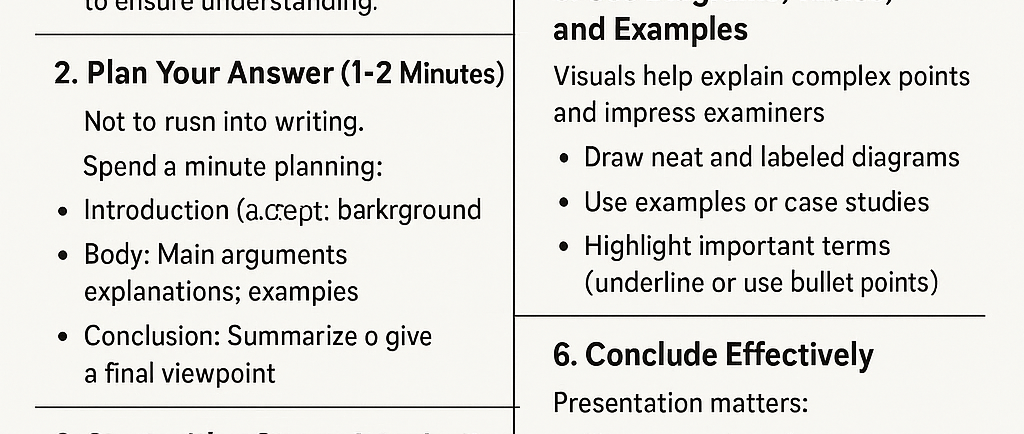How to Write Long Answers in Exams: A Complete Guide


Writing long answers in exams can be intimidating, especially when time is limited and there’s pressure to perform. However, with the right approach, you can craft well-structured, high-scoring answers that impress examiners. This guide will help you understand how to write long answers effectively, step by step.
1. Understand the Question
Before writing, read the question carefully. Identify:
Keywords (e.g., explain, analyze, compare, justify)
Topic and subtopics
Marking weightage (more marks = more detailed answer)
Tip: Rephrase the question in your mind to ensure understanding
2. Plan Your Answer (1-2 Minutes)
Don’t rush into writing. Spend a minute planning:
Introduction: Define the concept or background.
Body: Main arguments, explanations, examples.
Conclusion: Summarise or give a final viewpoint.
You can quickly jot down bullet points or a rough outline.
3. Start with a Strong Introduction
An ideal introduction:
Addresses the question
Provides definitions or background
Briefly outlines what your answer will cover
Example:
If the question is about Newton’s Laws, define what they are and mention that you will explain all three with examples.
4. Develop the Body Logically
Divide the main content into paragraphs. Each paragraph should:
Begin with a topic sentence (main idea)
Contain facts, explanations, and examples
Be logically connected to the previous one
Use headings or bullet points if the exam allows, especially in science or social science papers.
5. Use Diagrams, Tables, and Examples
Visuals help explain complex points and impress examiners. If applicable:
Draw neat and labeled diagrams
Use examples or case studies
Highlight important terms (underline or use bullet points)
6. Conclude Effectively
Your conclusion should:
Summarize key points
Reflect the main idea
Be brief and clear
Avoid: Repeating the introduction word-for-word.
7. Write Clearly and Neatly
Presentation matters. Ensure:
Legible handwriting
Proper spacing between paragraphs
Correct grammar and spelling
Use short sentences for clarity, and avoid overcomplicated language.
8. Manage Your Time Wisely
Don’t spend too long on one answer.
Allocate time based on marks (e.g., 20 marks = ~20 minutes).
Leave a few minutes to review and correct mistakes.
Bonus Tips:
Practice writing long answers during preparation.
Memorize key definitions and examples.
Solve previous year’s papers for time management.
Conclusion
Long answers test not just knowledge, but clarity, structure, and presentation. By understanding the question, planning your response, and expressing your ideas clearly, you can turn long-answer questions into scoring opportunities. Practice is the key — the more you write, the better you get.
